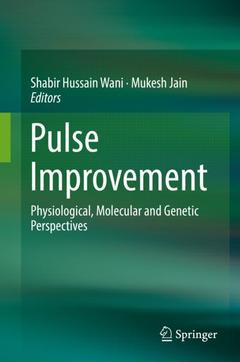Description
Pulse Improvement, 1st ed. 2018
Physiological, Molecular and Genetic Perspectives
Coordinators: Wani Shabir Hussain, Jain Mukesh
Language: English
Subjects for Pulse Improvement:
Support: Print on demand
Description
/li>Contents
/li>Biography
/li>Comment
/li>
Advances in molecular biology and genome research in the form of molecular breeding and genetic engineering put forward innovative prospects for improving productivity of many pulses crops. Pathways have been discovered, which include regulatory elements that modulate stress responses (e.g., transcription factors and protein kinases) and functional genes, which guard the cells (e.g., enzymes for generating protective metabolites and proteins). In addition, numerous quantitative trait loci (QTLs) associated with elevated stress tolerance have been cloned, resulting in the detection of critical genes for stress tolerance. Together these networks can be used to enhance stress tolerance in pulses. This book summarizes recent advances in pulse research for increasing productivity, improving biotic and abiotic stress tolerance, and enhancing nutritional quality.
Dr. Shabir Hussain Wani is a senior assistant professor at Mountain Research Centre for Field Crops, Sher-e-Kashmir University of Agricultural Sciences and Technology of Kashmir, J&K, India. He received his B.Sc. in agriculture from BhimRao Agricultural University Agra, India, and M.Sc. in genetics and plant breeding from Central Agricultural University, Manipur, India, and Ph.D. in plant breeding and genetics on “transgenic rice for abiotic stress tolerance” from the Punjab Agricultural University Ludhiana, India. After obtaining his Ph.D. he worked as research associate in the Biotechnology Laboratory, Central Institute of Temperate Horticulture (ICAR), Srinagar, India. He then joined the Krishi Vigyan Kendra (Farm Science Centre) as program coordinator at Senapati, Manipur, India. He teaches courses related to plant breeding, seed science and technology, and stress breeding and has published more than 100 papers/chapters in journals and books of international and national repute. He served as guest editor and reviews editor for journal Frontier in Plant Science (2015-2018). He has also edited several books on current topics in crop improvement for abiotic stress tolerance published by Springer Nature and CRC Press USA. His Ph.D. research won first prize in the North Zone Competition, at national level, in India. He was awarded a Young Scientist Award from the Society for Promotion of Plant Sciences, Jaipur, India, in 2009. He is a fellow of the Society for Plant Research, India. Recently, he received Young Scientist Award (Agriculture) 2015 from Society for Plant Research, Meerut, India. He also served as visiting Scientist at Department of Plant Soil and Microbial Sciences, Michigan State University, USA under the UGC Raman Post Doctoral Fellowship programme. He has attended several international and national conferences, presenting his research.
Dr. Mukesh Jain is an Associate Professor in the School of Computational & Integrative Sciences, Jawa
Written for scientists in universities and research institutes, as well as graduate and post graduate students in the area of pulse crop biochemistry, physiology, genetics, breeding and biotechnology
Up-to-date contributions by experts from international research centers and universities
Practical knowledge and strong scientific foundation for pulse improvement




